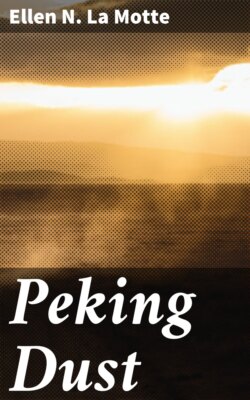Читать книгу Peking Dust - Ellen N. La Motte - Страница 10
На сайте Литреса книга снята с продажи.
IV
RACE ANTAGONISMS
ОглавлениеTable of Contents
It is a crisp, cold morning, but nothing to what it will be, they tell us, when the autumn is over, and the bitter winter settles down upon North China. After all, come to think of it, we are abutting on two extremely Northern provinces, Manchuria and Mongolia, and these adjoin Siberia, which all the world knows is cold. So this sharp October day, with its brilliant blue sky and hard, glittering sunshine, is only a foretaste of the weather that will come later.
To-day we went into the Chinese City and visited a native department store. At the best speed of our rickshaw-boys we passed out of the Chi'en Men, the principal gate, and once beyond the towering, embattled wall that separates the Chinese from the Tartar City, we lost ourselves in the maze of narrow, winding streets that open on all sides from the main road leading from the Chi'en Men, which, by the way, has been in the possession of the American troops since the Boxer uprising. In the narrow hutungs our progress was slow; we literally shoved our way through crowds of rickshaws and thousands of pedestrians, and as there are no sidewalks, we were alternately scraping the walls and shop fronts on one hand, or locking wheels with Peking carts on the other, and feeling the warm breath of a camel or donkey down our necks whenever the traffic brought us to a halt. Finally our boys stopped before a large building about three stories high, emblazoned with gold dragons, and with gorgeous red and yellow banners and flags all over the front of it. It stood some distance back from the street, and the wide courtyard in front was filled and crowded with the carts and carriages of the high-class women who had gone inside to shop.
I have already told you that Chinese horses can't be driven; they must be led along with great show and shouting. Well, when they stop they can't even be trusted to stay in harness; they must be unharnessed and removed to a place of safety. Therefore the courtyard of this department store presented a unique appearance, filled with twenty or thirty Peking carts, empty, tilted back on their haunches, with shafts gaping toward heaven. Also, the horses had been removed from innumerable little coupés of ancient date, with the superstructure all of glass, so that the occupant within is completely visible from all sides, like a fish in an aquarium. Horses and mules, in gorgeous, glittering harness, were carefully stood apart, or were being led up and down in the crowded courtyard to cool off. Though why cool off, after a dash through the streets at two miles an hour or less, I couldn't see. However, here they all were—great, high white horses, shaggy Mongolian ponies, and magnificent mules, the latter by far the most superb animals I've ever seen. I am not much at heights, but the mules were enormously tall, enormously heavy, very beautiful beasts, white, red, yellow, and black, and sleek with unlimited polishing and grooming. They were clad—that's the only word—in heavy, barbaric harness, mounted with huge brass buckles, and in some cases the leather was studded with jade, carnelian, and other semi-precious stones.
